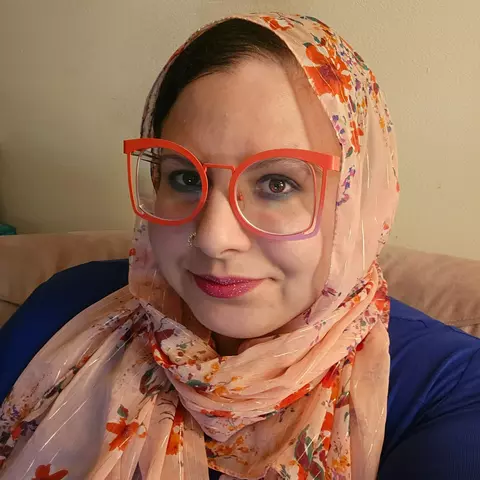Dr. Maha Hilal

Dr. Maha Hilal is a Muslim Arab American and an expert on institutionalized Islamophobia, the War on Terror, and counternarrative work. She is the author of the book Innocent Until Proven Muslim: Islamophobia, the War on Terror, and the Muslim Experience Since 9/11 and her writings have appeared in Vox, Al Jazeera, Middle East Eye, Newsweek, Business Insider, The Daily Beast, and Truthout, among others.
Dr. Hilal is also the founding Executive Director of Muslim Counterpublics Lab, an organization whose mission is to disrupt and subvert dehumanizing narratives that are designed and deployed to justify state violence against Muslims and an Adjunct Professorial Lecturer at American University in Washington, DC. She earned her doctorate in May 2014 from the Department of Justice, Law and Society at American University in Washington, D.C. She received her Master’s Degree in Counseling and her Bachelor’s Degree in Sociology from the University of Wisconsin-Madison.
Presentations from Facing Race 2024
Anti-Palestinian racism is at an all time high but many can not recognize it when they see it. Learn the ways that Anti-Palestinian Racism manifests in our institutions and is normalized structurally between institutions impacting not only Palestinians, but also Arabs, Muslims, and others. In order to effectively dismantle racism, it’s important to recognize it, but then work towards intentionally dismantling it. This breakout session will go over roots in Islamophobia and the unique ways anti-Palestinian racism manifests and what people in Government (including all institutions) and in the public can work together to dismantle it. Learn lessons from local organizers in NJ who are organizing to build power for inclusive communities for everyone.
Muslim communities have been at the forefront of many organizing conversations this year, however the progressive movement has yet to understand Islamophobia as a structural phenomenon just like other racial justice issues, that is oftentimes connected to other forms of racism and xenophobia. Recognizing that systemic and institutionalized Islamophobia impacts all marginalized communities through increased state repression, makes it even more imperative to challenge it in our collective social justice fights.
Despite the last two plus decades of the targeting of Muslims in the War on Terror, Islamophobia has often been addressed and challenged as interpersonal violence, which has served to obscure and absolve the state of the institutional violence against Muslims that it has implemented, sustained, and perpetuated. Discounting At the same time, the proliferation and exponential increase of Islamophobia across the globe by other states has largely gone uncontested. In order to expand the conversation on combating Islamophobia, this workshop will engage participants in activities including how we can collectively articulate and define of this system of oppression, discussions on how Islamophobia is impacting Muslims domestically and across the the globe, deconstructing problematic and demonizing narratives of Islam and Muslims, and how to create community accountability campaigns to confront Islamophobia beyond its most obvious iterations, including how it is weaponized against other communities. This includes activities that highlight the industries that are complicit in and that profit from Islamophobia and/or complicit in affirming violence against Muslims and how to confront these forces.
Presentations from Facing Race 2018
The attacks on 9/11 ushered in a set of laws and policies that have almost exclusively targeted Muslims and those racialized as Muslims. Despite this fact, the systemic nature of Islamophobia has only recently, has entered the public consciousness in a significant way. In order to properly situate Islamophobia in the course of the War on Terror and how it has been institutionalized, it is important to for activists and advocates alike to understand the legacy of the War on Terror and the fact that it was former President Bush that built its violent infrastructure and former President Obama who perpetuated it. Understanding Islamophobia as systemic necessarily moves conversations beyond simply resisting one manifestation of it to resisting an entire system that demonizes and criminalizes Muslims. Through a combination of large discussion and small group work, this workshop will focus on understanding the breadth and scope and Islamophobia, how it has been institutionalized, how it intersects with other forms of oppression, the narratives that help Islamophobia thrive (including many from the left), and interventions to challenge institutionalized Islamophobia in the form of state violence. Participants in the workshop will leave with a solid definition of Islamophobia and how to make their work more intersectional through understanding how Islamophobia relates to other systems of oppression, while also having the opportunity to critically examine narratives of Islam and Muslims - including those that are seemingly benign. Lastly, participants will leave with a set of tools to intervene in state violence.